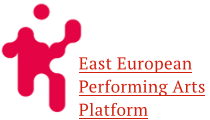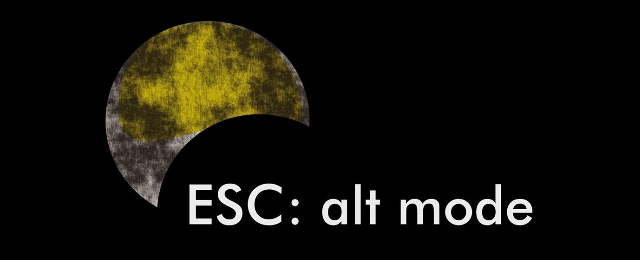East European Performing Arts Platform (EEPAP) supports the
development of contemporary performing arts (dance and theatre)
in 18 countries of Central and Eastern Europe.
Call for Papers: International Conference for Young Theatre Critics
The Lithuanian Theatre Agency would like to invite young theatre critics and researchers (students and graduates under 35-years-old), as well as other theatre enthusiasts, to take part in the 7th International Conference for Young Theatre Critics, which will be held in Vilnius, Lithuania on the 29th and 30th of September 2017.
The deadline to submit entries has been extended to 19 August.
The 7th International Theatre Conference for Young Theatre Critics, held under the topic ‘ESC: alt mode’, will take place during the 14th Vilnius International Theatre Festival, ‘Sirenos’. The participants of the conference will be provided with free passes to performances in the Lithuanian showcase that take place during the days of the Conference, with an opportunity to attend the newest productions in Lithuanian theatre. The Conference will be moderated by Ott Karulin (Estonia) and Andrew Haydon (UK).
For the 7th time, the Conference invites young theatre professionals from different countries to discuss relevant issues about contemporary performance arts. The aim of the conference is to provide a meeting place for the youngest generation of theatre researchers from different theatre schools, to share their personal experiences, as well as discuss specific theories and hypotheses. This year we will focus on the issues of theatre makers abroad, under the title:
ESC: alt mode
The equivalent for the escape key on some early keyboards was labeled, ‘Alt Mode’. ‘ESC’ was created later to allow programmers working with diverse machines to switch from one type of code to another. So, first it was an alternative mode, then it was a way to escape? Switching from the language of computers to the language of theatre – where do our theatre makers escape? What is their alternative mode?
Creating abroad
‘If I’d be stubborn enough to stay and work here, and only here, most probably I would have changed my profession long ago, or I would have ended up in a nut-house’ – taken from an interview with Lithuanian theatre director Cezaris Graužinis, who is already living like a local in Greece after previously having staged work in Poland, Finland, and many other foreign theatres.
When visiting theatres in Russia, you can hear them speak of ‘our Karbauskis’, or in Italy of ‘our Nekrošius’. Oskaras Koršunovas and Yana Ross also have a presence all over, with young theatre makers and dance companies trying to find ways to create and present their works abroad first, or to tour with them – so before Lithuanians have a chance to see their works, they could already be receiving applause in China, the USA, or somewhere else in Europe. Some theatres are based around touring internationally – what is (still) so interesting about Lithuanian theatre?
When abroad is Lithuania
During the past years of theatre in Lithuania, the tragedy of the 13th of January or the issue of partisans was analysed by a Latvian director, and the question of what is #fatherland to our Lithuanian-Russians (or people of an even more mixed origin) was asked by a Russian director. For the past three years, the Golden Stage Cross – the most prestigious theatre award in Lithuania – has been given to Polish and German directors, as well as a director of Russian origin.
This year we are inviting young theatre enthusiasts to present reports and case studies, possibly with extracts from video interviews of theatre makers who would be interested in sharing their experience with staging abroad: How in a couple of months can you catch the local language of theatre? How do you get to know the local literature, or what type of drama is brought from the country the theatre maker comes from? How do you separate the in-jokes and what is not funny? What is different in the works by foreign theatre makers who stage in Lithuania? Why in some cases is a theatre maker unknown in his or her own country, yet a genius in another – what makes them displaced in their homeland? How to describe whether the work of art represents the mentality of the people from one country or another, if it is created by a mixture of nationalities? What makes theatre makers look for an escape, or an alternative mode, regarding the country they work in?
Proposals for papers should provide and address the following:
- Title
- Abstract (no longer than 350 words)
- Name of the author(s)
- Phone number
- Email address
- Country, city
- Short biographical note (maximum 200 words) or a one page CV
NB: The proposal in English should be in Word format. The working language of the Conference is English.
The deadline for the proposals to be sent is the 15th of July, 2017.
Proposals have to be sent to [email protected]
The deadline for sending completed papers is the 31tst of August.
The deadline for sending presentations for the report is the 20th of September.
The Lithuanian Theatre Agency will provide accommodation (for foreign participants) and meals for all participants of the Conference, as well as formal invitations for visas if necessary. The organisers of the Conference do not cover travel expenses.
Please share this information with anybody that might be interested in participating.
For further information, please contact:
Viktorija Ivanova | Lithuanian Theatre Agency
Organizer of the International Conference for Young Theatre Critics
e-mail: [email protected]
Šalnė Bučiūtė
Organizer of the International Conference for Young Theatre Critics
e-mail: [email protected]
www.facebook.com/youngtheatrecriticsconferece
More information here.

